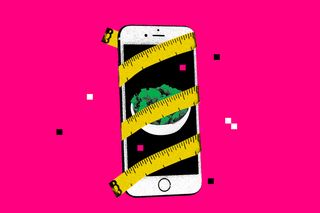
How Social Media Perpetuates Toxic Diet Culture
Food and nutrition content are popular on TikTok and Instagram — but experts are missing from the conversation.

The most viewed food content on Tik Tok promotes toxic diet culture that isn’t vetted by experts, found a new study. Published in PLOS One, the research conducted by scientists from the University of Vermont found that a significant portion of food content on the platform promotes weight-normative messaging — or the idea that a person’s weight is the most important indicator of their health.
As a result, food is treated as a means to an end — with the end being weight loss. “Each day, millions of teens and young adults are being fed content on TikTok that paints a very unrealistic and inaccurate picture of food, nutrition, and health,” said senior researcher Lizzy Pope. The study looked at 10 food, nutrition, and weight-related hashtags — each of which had over a billion views in 2020 when the study began.
The view count has climbed even further since then. “The fact that billions of people were viewing content about weight on the internet says a lot about the role diet culture plays in our society,” said the study’s co-author, Marisa Minadeo.
Body image researcher Nadia Craddock defines diet culture as “the collective set of social expectations telling us that there’s one way to be and one way to look and one way to eat and that we are a better person, we’re a more worthy person if our bodies are a certain way.”
But it’s not just a Tik Tok problem. Last year, Instagram apologized for promoting weight loss content to people with eating disorders, by recommending search terms like “appetite suppressants.” Although the platform imposed relatively strict bans on content that promotes eating disorders, its enforcement is often inadequate. In 2019, a Guardian investigation found thousands of “pro-ana” and “pro-mia” images on Instagram through accounts that actively promoted eating disorders like anorexiaand bulimia. What makes regulating such content harder, however, is the ambiguous lines between content that promotes eating disorders, and “regular” wellness and lifestyle-related content pertaining to food and weight loss. It speaks to a larger problem, then, with the way diet culture inherent in food content serves as a pipeline to eating disorders — and social media is amplifying the problem.
It’s even created a new eating disorder — orthorexia. A disorder that’s comorbid with anorexia, othorexia is when a person develops disordered eating due to an obsession with healthy food. Instagram has a significant role to play in increasing incidences of the illness, according to research.
Related on The Swaddle:
An Obsessive Need to Keep a Healthy Diet Could Soon Be Classified as an Eating Disorder
Previously, activists have flagged how Instagram contributed to eating disorders by promoting weight loss, calorie-counting, and similar types of content. “Vulnerable people are getting inundated with this content, and they aren’t even actively searching for it,” Hope Virgo, an eating disorder activist, told BBC.
Moreover, very few influencers who promote food or fitness-related content are actually qualified to dole out advice. With social media being a visual platform, the emphasis on health is tied to the purported appearance of good health — which is almost inevitably tied to weight. As a result, weight remains one of the most visible and incorrectly proliferated ideas about health online.
“Because my eating disorder was largely orthorexia (an obsession with “healthy” eating), I followed a lot of health and fitness accounts… Being constantly exposed to this kind of content really just fuelled my eating disorder and reinforced my skewed beliefs around food, weight, and health, making me think that my diet had to be ‘perfect,'” a person in recovery from an eating disorder told the NZ Herald.
It’s evident in the way that wellness influencers often promote their lifestyles and diets by attaching words like “clean” and “detox” to them — which stigmatizes all diets that don’t conform to the limited ones they follow as “unclean”. Smoothies, celery juice, and uncooked vegetables are some of the many examples of food touted as “clean eating” that experts have debunked. But the terminology carries an implicit value judgment that affects how people feel. One 2020 study suggested that “clean eating” posts on Instagram had the potential to promote weight dissatisfaction and restrictive eating.
“The wellness culture on Instagram is so damaging because it’s so fear-based. It’s saying, `If you don’t eat a certain way, you’re going to have bad skin or a bad body… It’s masquerading as health and wellness when in fact it’s the same message as always: that smaller equals healthier.” said therapist Kristi Hall, who specializes in treating eating disorders.
Social media, then, perpetuates the false notion that a person’s health is inextricably tied to their appearance — and that food is a way to achieve a desirable one. “Just like people are different heights, we all have different weights… Weight-inclusive nutrition is really the only just way to look at humanity,” said Pope.
Rohitha Naraharisetty is a Senior Associate Editor at The Swaddle. She writes about the intersection of gender, caste, social movements, and pop culture. She can be found on Instagram at @rohitha_97 or on Twitter at @romimacaronii.
Related


How Phone Addiction May Be Linked to Compulsive Shopping Behaviors
